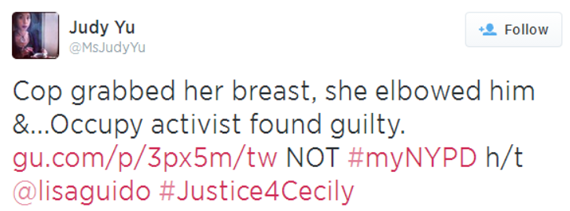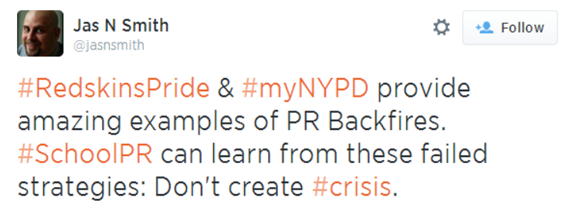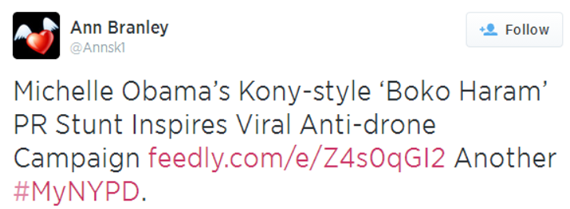The powerful voices criticizing the New York Police Department on social media are overwhelmingly male, new data shows.
Last month, the NYPD created the hashtag #MyNYPD and invited New Yorkers to tweet photos of themselves with police officers, expecting to create a feel-good social media moment. While a few photos featured smiling citizens appreciating their local police department, the hashtag was quickly overtaken by photos of police brutality and criticisms of the department.
The conversation around the #MyNYPD hashtag has been celebrated for amplifying voices that critique the New York Police Department as violent and heavy-handed, but an analysis of conversations containing the hashtag reveal that it presents an incomplete snapshot of New Yorker's sentiment: Women are underrepresented in the conversation.
Male voices dominate both the overall conversation and threads dealing with Occupy Wall Street, sexual assault and social media. The gender imbalance influences the direction of these discussions as when women do chime in, they have a different take on issues:
Cecily McMillan and Occupy Wall Street
A large portion of the discussion around #MyNYPD deals with the Occupy Wall Street movement and specifically with Cecily McMillan, a protester sentenced to three months in jail for assaulting a police officer as he dispersed Occupy Wall Street protesters. McMillan's conviction was controversial as she claimed that she had elbowed Officer Grantley Bovell in self defense after he grabbed her breast. While both genders have taken to social media to express their support for McMillan, men and women focus on different aspects of McMillan's experience.
Men largely discuss the trial itself. Their conversation centers around the decisions of Judge Ronald Zweibel, and they discuss both McMillan and the larger Occupy movement in terms of his judgement.
Women take a less legalistic perspective. Rather than focus on Judge Zweibel and McMillan's court case, they post about Officer Bovell's conduct, repeatedly using the keywords "Bovell," "grabbed," and "breast."
Although women are more likely to discuss McMillan's alleged assault, men dominate even the portions of the #MyNYPD discussion that center around sexual assault. The discussion diverges by gender: Women tend to have matter-of-fact discussions, using clinical terminology. Men use more empathetic language, bringing up terms like "humiliation" and "degradation."
Social Media and Hashtag Fails
We also see a gender divide in the portion of the #MyNYPD conversations that deal with social media strategy. Both genders criticize the New York Police Department's decision to create #MyNYPD and compare the hashtag to others that were similarly taken over by angry protesters. Although both genders compare #MyNYPD to other hashtags that backfired on their creators, they offer different examples of other failed social media campaigns.
Men participating in this strand of the discussion drew heavily on the sports world, comparing the #MyNYPD brand hijacking to the Washington Redskins' attempt to create a hashtag that would express team spirit. Soon after the football team announced the new hashtag on twitter, #RedSkinsPride had transformed into a forum for people to call the team out on its racially offensive name.
Women compared the failed #MyNYPD hashtag to a lesser-known strand of the news story about Boko Haram's kidnapping of Nigerian school girls. Earlier this month, Michelle Obama posted a photograph of herself holding a sign reading #BringBackOurGirls, a hashtag that had come to represent Western outrage at the kidnappings. The photograph inspired parodies in which people manipulated the image so that Obama's sign showed substantive critiques of her husband's drone policies.
Seeing the Disparity
Social media outcries are powerful because they allow the sentiment of the population at large to be heard louder than that of powerful organization. Hashtag hijackings have become a form of protest in which grassroots social media users criticize the sponsoring organization's.
We can only benefit from this amplified "voice of the people" if we can accurately figure out who is talking. We need to move beyond superficial measures like the existence and size of a trend and start using powerful analysis tools that allow us to segment the conversation.




